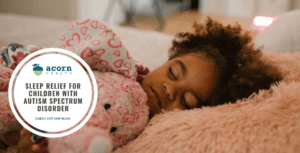Clinically reviewed by Paul Doher, BCBA, M.A., LBA, National Director of Clinical Quality

While newborn parents expect the phase of sleepless nights to come with having a baby, parents of children with autism may not experience the same relief of more restful nights as their kids get older. As many as 40 to 80% of children with autism struggle with sleep, so it’s no wonder that many parents of children with autism lie awake at night wondering why their child is struggling to fall or stay asleep, even as they get older.
The types of sleep issues that people with autism experience vary widely, including, but not limited to:
- Trouble falling asleep
- Waking in the middle of the night
- Experiencing poor sleep quality
- Extremely early wake-ups
- Difficulty maintaining consistent sleep routines
- Sleep apnea
- Less REM (restorative) sleep
Why Do Individuals With Autism Experience Sleep Issues?
Many people wonder why sleep issues occur more frequently with autism. There is actually a physiological component that may explain why. It starts with the chemical melatonin—which is typically released by your body to help regulate sleep cycles. Because many children with autism lack an amino acid called tryptophan, their bodies do not release melatonin at the correct time of day. When normal rhythms are thrown off due to chemical imbalances, it can potentially create sleep issues.
Another reason that they may have difficulty falling asleep at night is that they are unable to unwind at the end of the day due to overstimulation. It’s common that they remain stimulated longer, whereas neurotypical children may be able to decompress and prepare for sleep more easily.
How Lack of Sleep Impacts Parents and Kids
When your child is experiencing sleep troubles, it can impact all aspects of their physical and mental health, including:
- Increased aggression
- Irritability
- Hyperactivity
- Decreased cognitive performance
- Inability to focus
When children are experiencing sleep difficulties, it can impact the entire family unit. Lack of sleep causes parents to also experience irritability, lack of focus, decreased energy, and less patience throughout the day. Figuring out how to help your child with their sleep issues can also improve your health, especially when/if your sleep is being impacted when theirs is. If you think your child is experiencing sleep difficulties, make an appointment to speak to your child’s pediatrician, and make sure to also discuss it with your BCBA.
Now that we’ve reviewed how common it is for your child with autism to experience sleep issues, and what types of impacts they may experience, let’s dig into what you can do to help them.
What are the best ways to help your child sleep better?
- Create and practice regular daytime routines. Consistent daily routines significantly impact your child’s ability to wind down at the end of the day.
- Begin a sleep diary if your child’s sleep problems are consistent and problematic so you can identify patterns or triggers.
- Create a predictable and consistent nighttime routine. Here are tips from a previous Acorn Health blog post to help.
- Ask your BCBA about behavioral interventions that may be able to help
If you are looking for ABA services for your child with autism, please reach out to Acorn Health at 844-244-1818.
–
Frequently Asked Questions
There are some common questions parents ask regarding sleep issues connected to autism. Here are a few that we’ve provided our perspective on:
Does melatonin help children sleep better?
Yes, Melatonin can help if other behavior-based interventions have not proven to be successful. Your pediatrician should prescribe melatonin to help and keep them updated on how your child is doing while taking it so that dosage can be adjusted if needed.
Do weighted blanket help?
Weighted blankets have been used in the autism community for quite some time to calm individuals during situations where they are extremely anxious or upset. However, they do not work the same way for everyone. People who do not like heavy sensory touch may have the opposite reaction to a weighted blanket and maybe more excited or upset by that sensation. Because individuals with autism have such different neurological needs, there is no way to tell how the blanket may work for one individual vs. another until it is tried in a comfortable setting.